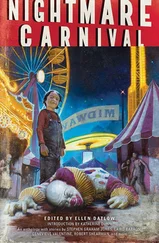Then he dreamed that he was in the open door of a plane several thousand feet above the earth and he had to jump holding a baby in his arms. It was his baby. He jumped, pulled the rip cord on the parachute, and it didn’t open. The emergency release didn’t work. He was falling fast. The wind tore at him fiercely. He was gripping the baby as tightly as he could but the wind pried under his arms, strained at his muscles, and suddenly the baby was loose, falling beside him, just out of reach. He flailed and groped in the air, trying to reach it. The baby was falling just a little bit faster than he was. It was below him, falling away from him as he fell after it. The earth screamed up at him. He knew that the baby was going to hit first and he would see it, would know it for a whole fraction of a second before he was smashed into a pulp himself. The terrible millisecond of that grief burst in him and he woke shrieking. He couldn’t get the dream out of his head. He prayed that he would have the dream again but that this time he would fall faster and be allowed to die first.
The dream was not to be monkeyed with. It did not come again and it would not go away.
Emily did not answer his letters. He got a formal letter from a lawyer “reminding” him that the divorce had gone through and that he had been denied all communication with the children.
That was when he remembered the freaks in the parking lot. Their strange twisted forms danced viciously in his head. They were cruel and jeered at him.
He decided that Teddy and Brenda were going to become freaks like that if Emily was allowed to raise them.
About that time Vern’s mother visited him and he was required to spend every morning and afternoon in the day room with the other patients. His mother made him think of the old lady at the trial. She never talked about why he was there. She talked about her farm, the dairy that Vern’s dad had built up and left to her when he died. She said she could sure use a man around the place. The hired hands were shiftless sneaks. She said Emily never let her see the children.
Vern hated the day room. He wanted to be alone again. Then he decided that he wanted to leave the hospital altogether. He started paying attention to the doctors and nurses.
He was released from the hospital three years and six months after he had entered it. His mother met him in the lobby and walked out with him. She led him to a big car and they got in. She drove him home to the farm where he had grown up. Mrs. Bogner took Vern on a tour of the farm and introduced him to the hands. It was spring and the garden needed a lot of work. While his mother fried chicken, Vern sat at the kitchen table and sketched a plan for the vegetable plot on a scrap of notebook paper.
That was Thursday. The following day was a payday for the hands Mrs. Bogner stuck to the old ways and paid her men and her bills with cash. Just after midnight Vern got out of bed, put on the tan work clothes his mother had bought for him, packed a brown paper bag with more clothes and shaving gear, and eased out of his room. He slipped past the old lady’s door and down the stairs. Vern’s father had always kept the cash box in a drawer beneath the flour bin in the kitchen. The key had always hung on a small nail in the door of the hall closet. Vern’s mother hadn’t changed anything.
He was parked outside the grade school at 8:30 on Friday morning. His mother’s car was newish and respectable. Vern pretended to read a newspaper and smiled to himself as he watched the kids straggle into school. A little before nine he began to worry that they might have gone in another door. For a moment he wondered if they might have changed so much that he wouldn’t recognize them. Then he saw them. They were together but arguing about something. Teddy gave Brenda a push and she stamped her foot and yelled at him. Vern rolled down his window. His whole body was suddenly flooded with sweat. His voice shook and came out too soft. They didn’t hear him. Brenda tried to stomp on Teddy’s sneakered foot and grab a book from him. Teddy laughed and held the book up out of reach. Vern found his old voice. He disliked their bickering. He always had.
“Teddy! Brenda!” The pair, caught in their quarrel, looked guiltily toward him. He was calm again. He knew them well, after all.
“Dad?” said Teddy. And Brenda, confused and not remembering, looked at her brother and said, “Dad?”
Disneyland was fine. They drove straight through two days, put up in a motel across the street from the enormous amusement park, and then spent three days from breakfast until bedtime glutting themselves on the wonder of it.
Vern was calm and happy. The kids were in a daze of ecstasy. They collapsed at night too tired to watch the television in their motel room. After they were asleep Vern would turn the set on, keeping the volume very low. Crouched close to the set he would watch the late news, listening carefully for mention of himself or the children. There was nothing. He knew the police would be looking whether the news mentioned it or not. He sat up late watching the kids sleep.
When they climbed into the car on the day after they had finished with the amusement park they obviously expected to be taken home. Brenda was bouncing a toy crocodile on a stick. “Mama will like this. I’m going to give it to her.” Teddy announced that he would give Mom the photo of himself in the race car. Vern had sidestepped their questions like a bullfighter for days. Now he took a slow breath and said he thought they ought to take a look at the Grand Canyon before they headed back. Maybe ride some horses down the trails.
They kept talking about their mother. Brenda started to worry about school. Her class had planned a roller-skating trip and she suddenly realized that she had missed it. She came out of a gas station toilet crying pitifully. Vern was convinced that she’d been frightened by a molester and he roared through the door marked WOMEN to find nothing but a little room with cracked plaster, a damp, bitter smell, and a trail of sodden tissue paper on the floor. When he got back to the car Brenda was sobbing in the back seat with Teddy sneering at her and the station attendant, a plump teenager with a red oil rag hanging out of his hip pocket, was staring suspiciously at all of them. Vern handed him money and slammed his way into the driver’s seat. He flicked the engine on and whipped around in the seat to stare at Brenda. “Why are you crying? What happened?”
The child’s crumpled face opened. She wailed. She buried her head.
“She misses her friend Lucy,” chortled Teddy.
“Oh, for …” Vern put the car into gear, ripped out of the station and into the road, just missing a trash can and a flashy new motorcycle parked at the edge of the lot.
She cried for ten miles. When they stopped for lunch, Vern took his first bite of sandwich and chewed twice before he realized he was staring at a huge glossy poster of an armless, legless creature smiling out of a hairless head. Fish flickered beside the worm thing and the wavering blue background made it appear to be underwater. Silver letters marched across the bottom. “QUESTIONS?” they glittered. “ASK AQUA BOY!”
Of course he must have seen those posters before, as well as the red and silver ones of the twins that were scattered all down the coast and in every desert town, but he hadn’t recognized them.
Now he saw it, flush in the window of the drive-in burger joint — flaring out at the parking lot with fat girls and little kids trailing past on their way in and out.
• • •
He made up his mind right then, changing directions, and drove for two days without sleeping. The kids were silent now, wary. He wasn’t talking, couldn’t talk. He stopped in Redding and went into a sporting-goods store while they stayed in the car. He came out with a long box, put it into the trunk, and got back into the car and drove on. Teddy and Brenda were very good. They didn’t ask questions. They didn’t fight. They got out at gas stations to pee and didn’t ask for Cokes. They said, “Chocolate,” or “With cheese please,” when he looked at them in drive-in grub joints, but they said these things very quietly and humbly.
Читать дальше












